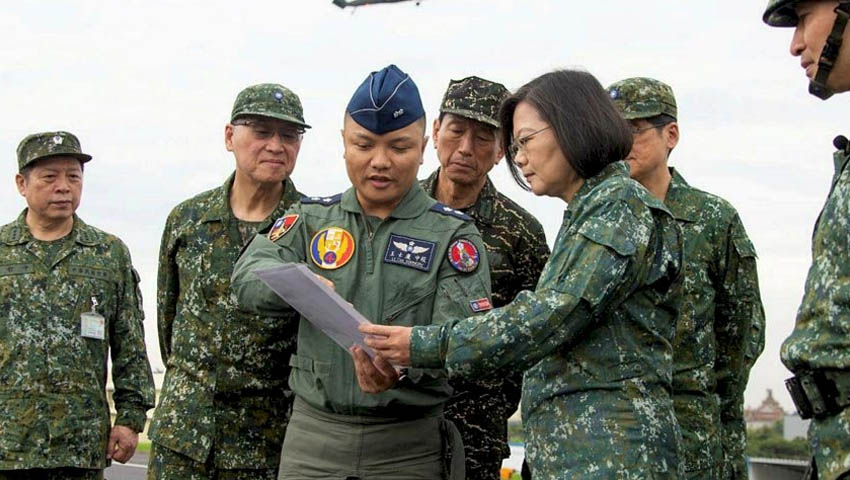One analyst explores whether recent aggression from Beijing has prompted Taiwan to rethink its national security set-up.
According to Corey Lee Bell, a Taiwan-based postdoctoral researcher and former editor of Taiwan Insight, a recent reshuffle of Taipei’s defence and national security team may be a sign of shift in strategy.
President Tsai Ing-wen announced a number of personnel changes in February, which included the appointment of a new defence minister and National Security Bureau director.
“While at least one of these changes had been months in the making, the fact that several occurred concurrently, and were announced just after the Chinese New Year break, has prompted conjecture that certain recent developments have prompted a shift in the island’s strategic thinking,” Bell writes in a piece published by the Australian Strategic Policy Institute (ASPI).
Bell notes that some observers suggest the changes were sparked by the election of US President Joe Biden, who is viewed by some public officials as less “staunch” in his support for Taiwan than his predecessor, Donald Trump.
“Perhaps unsurprisingly, some opposition politicians have strengthened their calls for the independence-leaning government of President Tsai Ing-wen, which has thus far adopted a hard-line position towards the mainland, to now adopt a more conciliatory stance towards Beijing,” he adds.
But Bell argues that the personnel changes may also have been triggered by the growing threat posed by Beijing’s model of “unrestricted warfare”.
This, according to Bell, is evidenced by Taipei’s appointments.
He writes that the appointment of former director of the National Security Bureau (NSB) Chiu Kuo-cheng as Defence Minister “represents an anomaly”.
“Given the breadth of his expertise and contacts in the intelligence community, local analysts assume Chiu will set a new precedent for the role of defence minister by concomitantly managing defence affairs and co-ordinating with NSB sources to exercise direct oversight of the Military Intelligence Bureau,” Bell continues.
“Until now, these roles had been strictly segregated. The reason for this was a longstanding fear that a minister with direct access to both defence and national security intelligence resources would effectively have monopoly control over all the intelligence resources that reach the president.
“Presidents on both sides of the political divide have preferred to have the freedom to draw on a wide variety of sources and viewpoints, which places them in a better position to exercise executive discretion.”
Bell claims that Minister Chiu could have been selected to help counter China’s ‘grey zone’ tactics.
“[If] grey zone activity, rather than outright invasion, is China’s preferred approach to achieving ‘reunification’, Taiwan’s defence strategies, and not only its tactics, will need to be more immediately responsive to up-to-the-minute intelligence and analyses,” Bell says.
“Put another way, the defence of the island perhaps no longer entails simply determining the when and where of an invasion but requires an evolving and dynamic understanding of what counts as warfare, and how it may be prosecuted.”
The analyst uses the example of the growing frequency of PLA incursions on Taiwanese air space, which some claim are aimed at “weakening Taiwan’s defences through attrition” by forcing the nation to deploy its smaller fleet of jets, increasing the need for maintenance and risking pilot fatigue.
“However, if Taiwan limited its responses to incursions to mitigate this problem — as reportedly recommended by US military figures — it could cede de facto control of patches of airspace to Beijing,” Bell warns.
“That could be a precursor to an extension of the Chinese air defence identification zone deeper into the island’s territory, and possibly even lead to the PLAAF expelling Republic of China Air Force assets from their own airspace.
“This is but one example of how up-to-the-minute access to multiple intelligence sources could mitigate the risk of tactical victories morphing into strategic blunders.”
Bell adds that the appointment of Chen Ming-tong to the position of head of the NSB could also point to a shift in strategy.
“Chen is an ‘old China hand’ who had shifted directly from a position of minister of the Mainland Affairs Council. This shift, when added to the fact that Chen doesn’t have a military or intelligence background, makes his selection highly unconventional,” he writes.
Bell argues that Chen’s appointment may have been aimed at ensuring Taiwan can better identify and define covert attacks on its sovereignty.
“There are growing concerns over issues like media ownership, foreign investment, political lobbying, disinformation campaigns, and even unmanned drone use,” the analyst notes.
“Such is the anxiety at the new threats Beijing poses that Taipei has adopted firm measures some have criticised as draconian, including the five national security laws and the Anti-Infiltration Act.
“The advantage of bringing a ‘China hand’ into a leadership position in the NSB under these circumstances is that, while he may know less about how to gather intelligence on threats, he will probably know more about how those who devise them think, and where such threats may be found.”
As such, Bell writes that these “convention-defying changes” could form part of the Tsai administration’s “second, and perhaps more profound”, wave of defence reforms.
“The first reform, the adoption of the overall defence concept, marked the shift to an asymmetric doctrine that belatedly acknowledged and adapted to the loss of the balance of power across the Taiwan Strait,” he writes.
“However, the core of that strategy still revolved around recognising the centrality of the ‘invasion scenario’ in defence thinking.
“To the extent that the new personnel changes mark a response to China’s ‘unrestricted warfare’ model, they perhaps reflect a transformation from Taiwan’s defence brass preparing for the war they fear to adapting to the new types of warfare that are already being waged.”
Bell concludes: “While it remains to be seen how these changes will pan out, the concept of realigning defence and intelligence to prioritise those threats and scenarios China prefers appears, in theory at least, to be the right approach for the tiny island to better marshal its limited resources.
“It should also offer food for thought for other nations in the region and Taiwan’s more distant middle-power allies.”
Get involved with the discussion and let us know your thoughts on Australia's future role and position in the Indo-Pacific region and what you would like to see from Australia's political leaders in terms of partisan and bipartisan agenda setting in the comments section below, or get in touch with

 Login
Login








